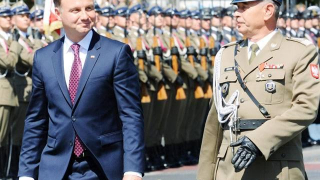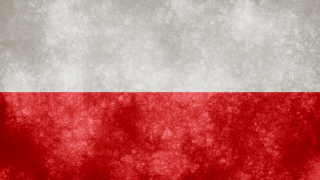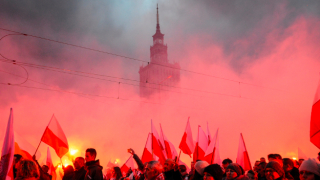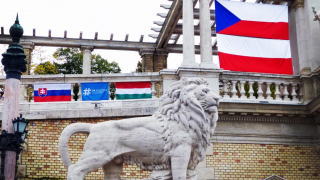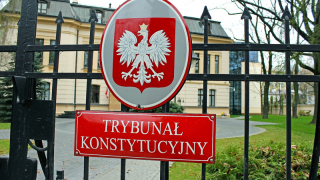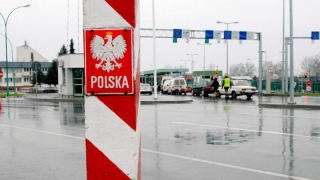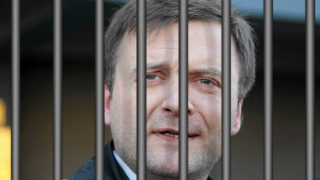Fairytale Polish Empire
Nearly one million square kilometres, territories from Estonia to Moldavia and from Silesia to Smolensk (of course, not at the same time ...), "Shuysky Tribute" (no matter that made by EX-tsar), the Winged Hussars (drowned in the mud of the Zhovti Vody and Korsun, plucked in the Batih Riveri, following the Swedish Delugeii or descending in subsequent wars). Polish Empire. Dream which is not only indestructible, but unfortunately never actually existed – but still influent Polish (geo)political thinking.
No durability
Maybe it is just a kind of mind cure but Poles, who now become humble slaves of the American Empire – still dream about our own and that is one of the reasons why is so easy for Washington to use us against Russia, in Ukraine, Georgia, Chechnya and in any other place where we could imagine Polish Hussars... Yes, that's childish. But we were always just a kids playing a politics and especially – geopolitics.
The real Empire exist when posses lasting advantages, and Polish–Lithuanian Commonwealth even at the time of the greatest territorial extent, at the beginning of the 17th century had not such a potential - nor political, economic, and military. On the contrary, it turned out that we reached the limits of growth at that time, the last attempt to win the rivalry with Moscow for Eastern domination, authentic roots of the power - was not a success. A systematic recession of our geopolitical position and international importance began and elements of the destruction imprinted in our political system started to growth. Likewise, earlier (as it turned out - accusatory) manifestations of the potential of the Polish state (Polish-Lithuanian) were not nodal points of history, allowing for an imperial stage. Such a moment was not, for example, Battle of Grunwaldiii, but a symbolic (in a negative sense, unfortunately) role can be attributed to a similar time, and rarely in Polish historiography mentioned the Battle of Vorskla Riveriv, where the Polish army did not support enough Great Lithuanian Duke Vitold in his plans organization of the Eurasian area in different than Moscow way.
In my historical work I try to describe to the Poles all accessible doors to the power from the past which has closes one by one to our ancestors. Firstly, the failure of our own forces - the whole of Corona Regni Polonia, with Silesia and Pomerania (which we loose first to the Czech and with them – to the Germans, and second to the Teutonic Knights) which process only occasionally kept the mind of the present political elites. On addition, turning to the East was nearly always misinterpreted (not only by Polish historians) and never was anything more than chaotic, poor organised events and even so good written in Russian historiography influence of the popes and Jesuits wasn't sufficient to creation any really strategical, civilizational Polish plan for the East. Just opposite: if we point Battle on the Vorskla River as start of Polish retreat from the East even before we thought we started our march, the second symbol was when the tsar Aleksey Mikhailovich held up his troopsv which went to help Poles against Cossacks Uprising. Indeed the only one chance to hold Polish Eastern policy was to coordinate or even unite with Russian one! Yes, it sound paradoxically now, but for some part of Polish political nation was clearly seen even 450 years ago! The idea of calling for Polish-Lithuanian throne first tsar Ivan IV Vasilyevich, then his son, Fyodor I Ivanovich– was quite popular among the crowds of nobles (not only orthodox). Even after Polish-Russo Thirteen Years' War of of 1654–1667 there were an agreement between Poland and Moscow about the kind of succession of the Polish-Lithuanian throne by the common acceptance for tsar Aleksey Mikhailovich as a candidate for a King and Great Duke. And this very attractive for both sides and rescue for Poland concept was rejected by part of blind Polish noblemen and Roman-Catholic hierarchy. Of course, unification of Poland and just forming modern Russian would change not only the borders but also whole our nation. We were to go East not to Westernise it but to Easternise ourselves. We never would be the same on the both sides – because there wouldn't be sides at all. No one know how such a fundamental, civilizational change could look like and no one knows possible results of such process for sure it would be World-changing historical event for all the Europe and maybe even for the hole Eurasiavi.
The absence of these potential Western or permanent Western powers was in no way compensate by the chaotic alternatives, as the uncoordinated Jagiellonian activity in the Central European regionvii, and then drawing into the Balticviii. These were not even surrogates of the superpower, but simply dispersed. Hence, the good symbols of our dream about the empire are not maps showing the maximum range of internally interfered, infertile Jagiellonian dynasty, nor the weak progress of Poles and Lithuanians on the Baltic area. The Empire could become in two basic ways: either re-unification in one country the whole of Polish lands, defeating Moscow (but defeating to occupy her place) or unite with it to create completely new and complementary Slav project. All these tasks could not be realized in the same time and at last hasn't been realized at all.
Tombstones and tilted doors
In the absence of permanent factors of the superpower - we have fixed many catalysts of falling down. After the Piastsix, we did not generate any national dynasty and efficient political system, which was then the conditions of the Great Powers. Then there were fundamental errors, of an intrinsic nature as well as of the international position of the Commonwealth, which defeated this project, including such fundamental as:
- gradual emancipation of Prussiax,
- blocking for ourselves even basic possibility of operating in the East, with a sad symbol , the Brest Unionxi (which was invented just before Polish-Lithuanian Commonwealth reached the biggest geographical and ultimately nullified optimistic impression of this “success”),
- the consistent functioning of Poland and then the whole Commonwealth as the Paradisus Iudaeorum what meant the growth of the unsurmountable socio-economic problems for the state and the societyxii.
And all these fatal in results disasters were quite visible and transparent and even indicated by a few clever men during all these two Centuries between Grunwald and Kircholmxiii, and therefore these Times only by ourselves are so-called "Golden age"!
The image of the "Polish Empire" as something more than just a potential possibility – was and still is extremely untrue and dangerous. In the past – because it took away any will of changing anything in Poland, because the memory of olden Glory was enough for our ancestors. Now the same remembrance is a curtain hiding present poor geopolitical and social condition of Poland. Of course also the fatalism seen in the history of the Commonwealth is incorrect and we shouldn't think about the history of Poland as one, uninterrupted way down (although it's indeed an example of exceptionally long multiplication of political wrong decisions in hardly ever issue: geopolitical, legislative, economical, social, religious etc.). To put it simply - even without transforming into an empire, Poland did not have to fall completely; on the contrary, even in the most difficult of times, we had still some potential to rescue our homeland. Fact that we didn't manage this task it's a proof of special and fatal thoughtlessness of our ancestors. Even mentioned “doors the Empire” from time to time were opening as a possibility of creation a dynasty (Piasts, West-Pomeranian Gryfits), joining and influencing another imperial project (with Romanovs, Habsburgs or Hohenzollerns) or catching lost Western Polish land bit by bitxiv. Finally Polish elites never decided to take any risk, never even prepared any brave vision so the “Polish Empire” became only a dream from the popular category “IF we only be lucky...!”. And some Poles are still dreaming.
Konrad Rękas
i Battles of Zhovti Vody (29 April to 16 May 1648) Korsun (26 May 1648) and Batih (1 – 2 June 1652) were considered as the most severe defeats of Poland during the Khmelnytsky Uprising (1648-1657) which separated the majority of the Ukrainian lands from the Polish-Lithuanian Commonwealth.
iiPopular name of Polish-Swedish war 1655-1660 (being a part of the Second Northern War).
iiiOn 15 July 1410, Polish-Lithuanian-Ruthenian-Tatars army beat the knights of the German Teutonic Order, helped by crowds of Western knights.
ivOn 12 August 1399 during the war for power in the Golden Horde, between the armies of the khan Tokhtamysh (assited by the Lithuanian Army) against Edigu and Temur Qutlugh.
vAfter the Battle of Korsun.
vi Just a tragical parody of this great project was Polish intervention in Moscow during the Time of Troubles, 1605-1618, realised straight on the demand of the Jesuits and Rome.
viiPolish King Władysław of Varna (31 October 1424 – 10 November 1444), was also the King of Hungary fighting against Ottoman Turkey; son of his brother, King and Great Duke Casimir the Jagiellon (30 November 1427 – 7 June 1492), Vladislaus II (1 March 1456 – 13 March 1516) became King of Hungary and Czech.
viii In 1587 Swedish heir to the throne, Sigismund Vasa (20 June 1566 – 30 April 1632) became King of Poland and Great Duke of Lithuania.
ix Piasts were Polish historical first dynasty ruling 10th -14th Century in Poland and till 17th Century in Silesia.
xHohenzollerns from Brandenburg were colligated with the Jagiellonian Dynasty and occurred as the allies of Poland in times of it's power. As a dukes of Prussia were vassals of the Polish Kings, still broaden a scope of their sovereignty, step by step turning against Poland when this state loose it's power. Quite similar tactics they managed later in relations with Russia.
xi Although in the Polish-Lithuanian Commonwealth even after the Union of Brest still existed some societies interested in existence of Polish-Lithuanian Orthodoxy. Defeating of this programme was one the main purposes of some Prussian provocations, like Bar Confederacy, Polish noblemen uprising in 1768 against alliance with Russia and religion minorities in Poland and the Pinsk Congregation (15 June 1791), which was an attempt to the establishing of some kind of „modern Orthodoxy” connected with pro-Western and pro-Prussian reforms introduced at the same time as a result of the British and Prussian pressures.
xiiBecause of the Polish indifference about three-quarters of the world's Jews lived in Poland by the middle of the 16th century with wide autonomy, their own judiciary and kind of the monopoly for the market activity which was forbidden to the Polish noblemen. The Jews, the noblemen and the Jesuits brought Poland to the disaster.
xiiiBattle of Kircholm, present Latvia (27 September 1605) was a big victory of the Polish-Lithuanian Army against Swedish, which became later a base for a legend of the undefeated Polish Winged-Hussars.
xivMembers of the Polish royal families, Jagiellons and Vasas in 16th and 17th Centuries ruled in some Silesian duchies and made nothing to re-unit them with the Polish crown.


